http://www.newenglandhistoricalsociety.com/two-loves-louisa-may-alcott/
Before Louisa May Alcott wrote Little Women, she wrote a book about a young girl named Sylvia in love with an intellectual like Ralph Waldo Emerson and a naturalist like Henry David Thoreau.
It was called Moods, and it wasn’t all that fictional.
Louisa May Alcott had an unrequited love for her schoolteacher Henry David Thoreau – and for her generous next-door neighbor, Ralph Waldo Emerson.
Thoreau, 16 years her senior, would not win wide acclaim as the author of Walden and Civil Disobedience until well after his death. He was recognized around town, though, as someone who marched to the beat of a very different drummer.
Emerson, nearly three decades older than Louisa May, had both fortune and fame as the leading Transcendentalist philosopher, lecturer, poet and essayist. He brought together the literary and philosophical community of Concord, Mass., where Louisa May spend much of her childhood. Emerson had inherited a large estate from his wife, Ellen Tucker, who died at 20, just two years into their marriage.
He supported Thoreau, promoting his work, hiring him for odd jobs and letting him live at his large house with his second wife and children. He gave and loaned money to Nathaniel Hawthorne and his wife Sophia Peabody. He bought houses for Bronson Alcott, the founder of alternative education and the father of Louisa May and her three sisters.
Alcott was an entertaining eccentric, a vegan before the word existed, and a poor provider for his family. Louisa May grew up poor in material things but rich in intellectual companionship.
Born on Nov. 29, 1832, she was a rambunctious, independent child. Susan Cheever describes her as ‘that hoping, dreaming girl with the long glossy hair.’
When she was about seven her father enrolled her in a school taught by Thoreau, then 23. Thoreau often took his students out of the classroom into the woods. He taught them about birds and flowers, gathering lichens, showing them a fox den and deer tracks, feeding a chipmunk from his hand.
Sometimes he took the children on his boat, the Musketaquid, and gave them lessons as they floated down the Sudbury and Assabet rivers. As they passed the battlefield where the American Revolution started, he explained how the farmers had defended themselves against the redcoats. Louisa recorded her vivid memories of those field trips in Moods.
Thoreau had love interests other than the smitten schoolgirl. Perhaps his lack of personal hygiene, his shabby clothes and terrible table manners put them off. Not Louisa. “Beneath the defects the Master’s eye saw the grand lines that were to serve as the model for the perfect man,” she wrote.
Louisa May’s crush on Thoreau competed with her interest in Emerson. Her family moved to a cottage next door to him. As a teenager, she often borrowed books from Emerson’s library and left wildflowers on his front step. He pretended he didn’t know where they came from.
Thoreau died in 1862, only 44 years old. By then, Louisa May Alcott was nearing 30, officially a spinster, after years of living in poverty. She had been working and writing potboilers, which brought in a little money, and volunteered as a Civil War nurse in Washington, D.C. There she fell ill and returned home to Concord in 1863.
Mourning Thoreau’s death while in the hospital, Louisa May had written a poem about him called Thoreau’s Flute. It was published in The Atlantic in the summer of 1863. It fell out of her papers and her father read it. The poem began:
We sighing said, "Our Pan is dead;
His pipe hangs mute beside the river;
Around it wistful sunbeams quiver,
But Music's airy voice is fled.
Spring came to us in guise forlorn;
The bluebird chants a requiem;
The willow-blossom waits for him;--
The Genius of the wood is gone.
His pipe hangs mute beside the river;
Around it wistful sunbeams quiver,
But Music's airy voice is fled.
Spring came to us in guise forlorn;
The bluebird chants a requiem;
The willow-blossom waits for him;--
The Genius of the wood is gone.
In 1869 Louisa achieved lasting literary fame with Little Women. Some say she based the character Laurie on Emerson … or was it Thoreau?
Louisa May Alcott died on March 6, 1888.
With thanks to American Bloomsbury by Susan Cheever. This story was updated from the 2014 version.



No comments:
Post a Comment